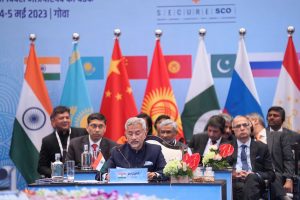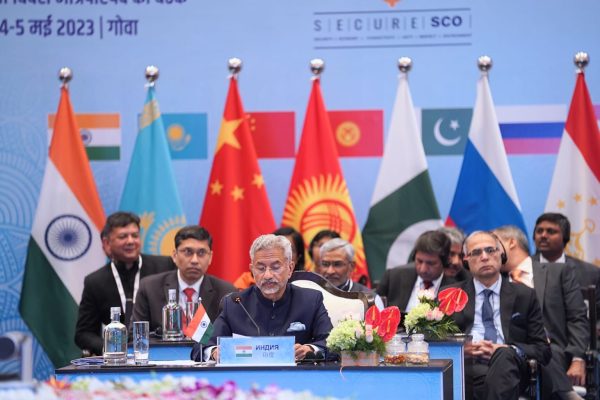
Indian External Affairs Minister S. Jaishankar delivers remarks at the SCO Foreign Ministers’ Meeting in Goa, India, May 5, 2023.
Credit: Twitter/ @DrSJaishankar
India is riding high on multilateralism in 2023. From the Shanghai Cooperation Organization (SCO) to the G-20 meetings, the Indian establishment is busy playing host to leaders from the Global South and the North. Last week, India was busy with the SCO Foreign Ministers’ Meeting in Goa on the Indian west coast.
Hosting the meeting, Chief Minister of Goa Dr. Pamod Sawant tweeted, “Indian presidency is driven by a commitment to SECURE SCO. Its key focus areas are startups, traditional medicine, youth empowerment, heritage and science & technology.” Highlighting the importance of India’s engagement with the SCO, an official statement reportedly said that the engagements with SCO have “helped India promote its relations with the countries in the region with which India has shared civilizational linkages, and is considered India’s extended neighborhood.”
The SCO is one of the older minilateral regional groupings that India is a part of. The group consists of Russia, China, and the Central Asian states. Pakistan and India became full members of the SCO in 2017. There are also currently four observer states – Afghanistan, Mongolia, Iran, and Belarus – as well as six dialogue partners – Armenia, Azerbaijan, Cambodia, Nepal, Sri Lanka, and Turkey. Iran and Belarus are anticipated to become full members at this year’s SCO Summit in July. This, along with the fact that Russia and China dominate the SCO, indicate the anti-Western character and goals of the grouping.
Established in 1996 as the Shanghai Five before expanding into the SCO in 2003, the group was meant to moderate the U.S. unipolar moment and limit Washington’s strategic pursuit in Russia’s backyard, or its “near abroad” as Russia calls it. From China’s viewpoint, it was also a platform to strengthen its economic outreach in Central Asia, although Russia has taken pains to ensure that the SCO remains a security-oriented institution rather than an economic one. For both Russia and China, it was also an instrument to limit the NATO’s expansion into the post-Soviet strategic space.
Diplomat Brief
Weekly Newsletter
N
Get briefed on the story of the week, and developing stories to watch across the Asia-Pacific.
Get the Newsletter
All of these ideals may have had some resonance in New Delhi until even a decade ago when India was less aligned with new security partners such as the United States, Japan, France, and Australia. It is not clear if these SCO goals are still consistent with India’s strategic goals, however. Today, under changed geopolitical circumstances, driven by the structural changes of Asian and global geopolitics, India has more in common with its new security partners than the SCO partners, especially Russia and China.
That being said, what were the substantial outcomes at the SCO Foreign Ministers’ Meeting? India’s External Affairs Minister Dr. S. Jaishankar in his opening remarks at the meeting highlighted what Prime Minister Narendra Modi had articulated as India’s goal for the SCO under its presidency – a “SECURE” SCO. “SECURE” is an acronym for “Security, Economic development, Connectivity, Unity, Respect for sovereignty and territorial integrity and Environmental protection.”
Jaishankar then went on to highlight major challenges including global supply chain disruptions, which have resulted in adverse effects on the supply of energy, food, and fertilizers, with most of the impacts being felt particularly by developing countries. Jaishankar said that these disruptions have led to “a credibility and trust deficit in the ability of global institutions to manage challenges in a timely and efficient manner.” In the minister’s view, the continuing failures and challenges of multilateral institutions can be a positive trigger for groupings like the SCO to frame a cooperative agenda. But this is going to be an uphill task for India.
With India’s ties with China and Pakistan going through one of their worst phases, it is difficult for India to pursue whatever limited agenda it may have with the SCO. Also, many of these disruptions were also a direct result of the Russian invasion of Ukraine in February 2022, which was not mentioned even once at the SCO meeting. With Russia and China continuing to form a united front against the United States and the liberal international world order, it is unclear what India can hope to achieve through mechanisms such as the SCO, or the RIC (Russia-India-China) or BRICS (Brazil-Russia-India-China-South Africa) groupings. But these efforts also are a strain on India’s limited diplomatic capacity, as former Indian Foreign Secretary Ambassador Shyam Saran wrote in a recent article.
Advertisement
Despite growing concerns from outside the Indian government, New Delhi appears quite confident that it can straddle the intensifying global divisions and keep all of India’s various partners happy. Whether this confidence is well founded or not is something that will become clear in the next few years.
